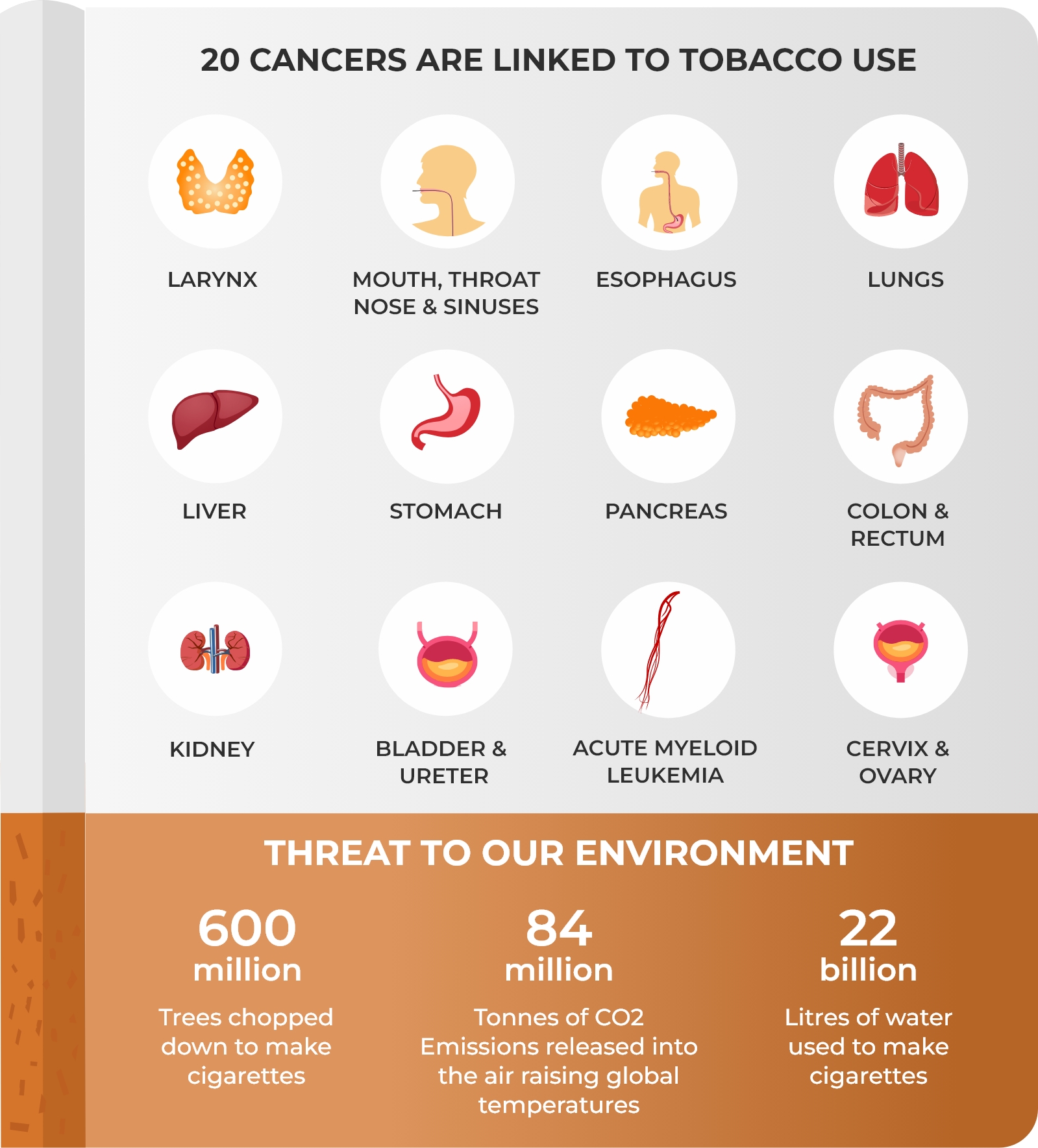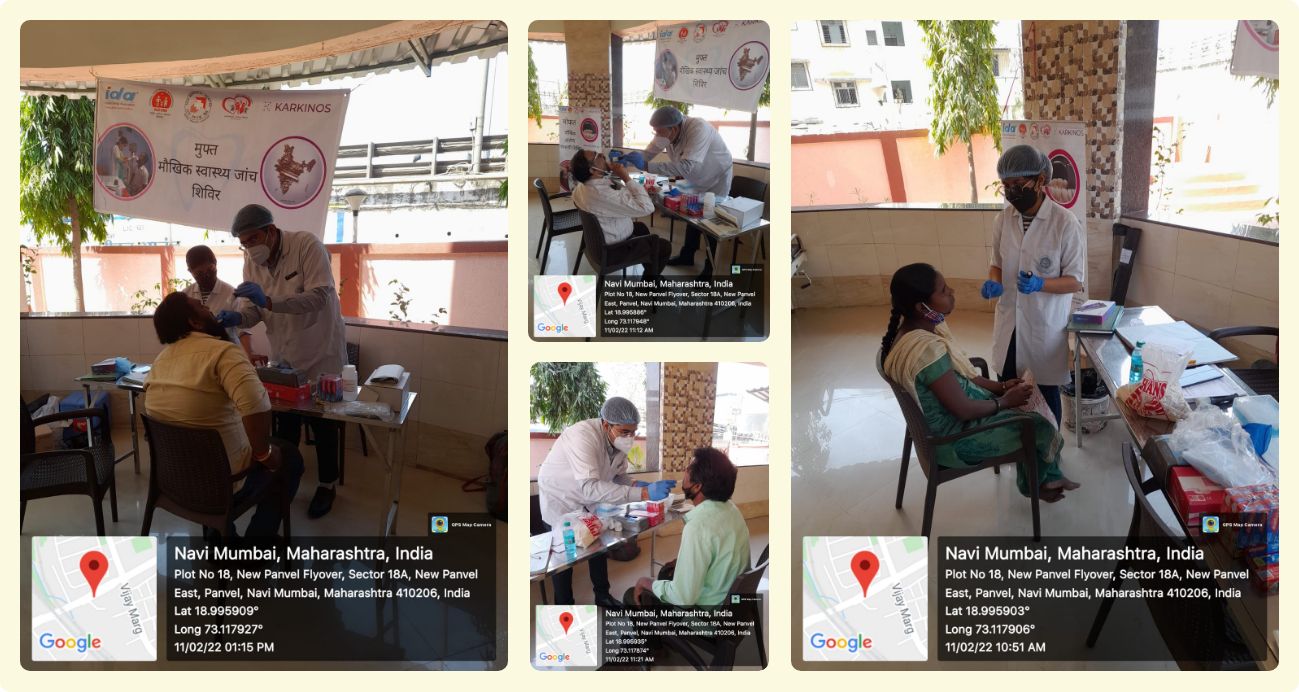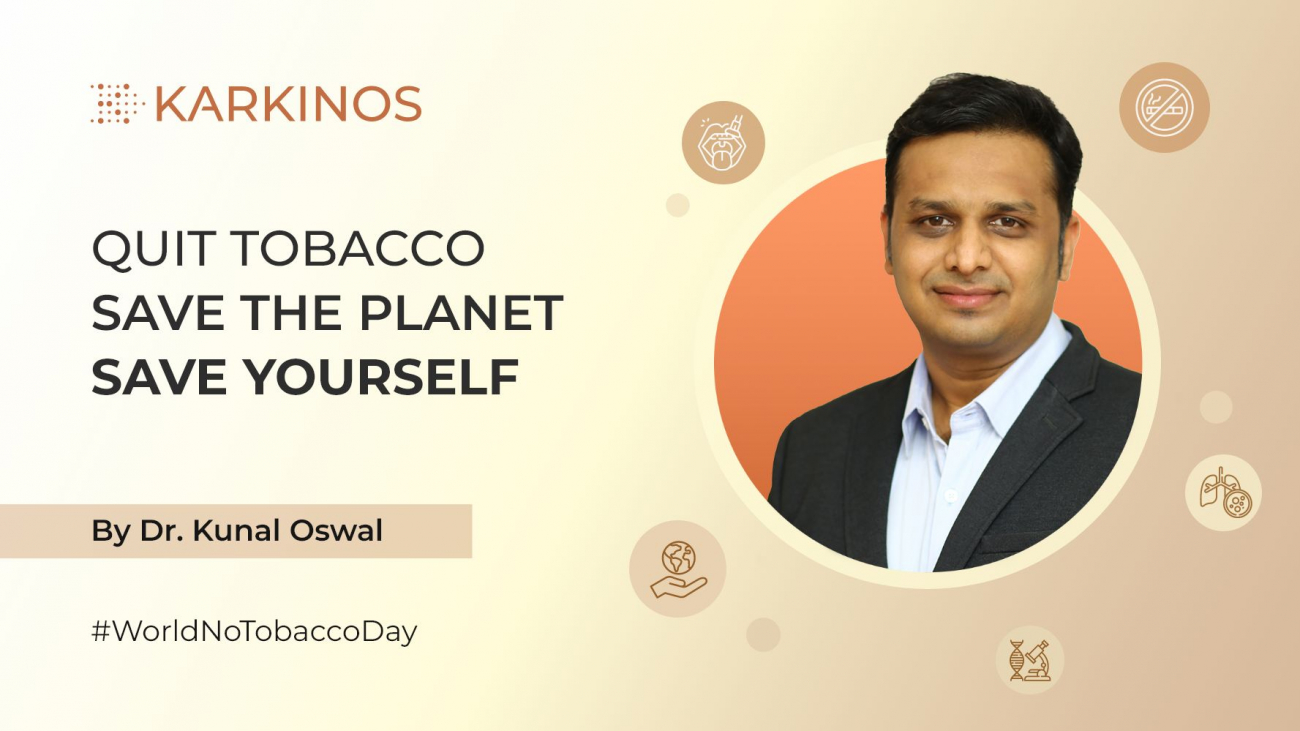A habit that can cost a life as well as the planet – Say no to tobacco, today
By Dr. Kunal Oswal, Program Manager, Karkinos Healthcare
Tobacco users, do you know what happens inside your body when you smoke a cigarette or chew pan? Worse even, do you know how much harm tobacco can do to our Mother Earth? You will be surprised to know that tobacco has about 7000 toxic substances that can cause serious health problems. In addition to being the major risk factor of cardiovascular disease, tobacco causes cancer and other lung and kidney ailments.
The hazards on health and environment caused by tobacco are huge and that is why the World Health Organization every year holds World No Tobacco Day on May 31. The goal is to spread awareness about the risks of tobacco use and how we can make the world tobacco free.
Also, this year’s World No Tobacco Day theme is “Tobacco: Threat to our environment.” The worldwide campaign aims to raise awareness among the public about the negative environmental impacts of tobacco – from cultivation, production, distribution, and waste.
The implications are dual-fold and on this important day, Karkinos Healthcare feels committed to raise awareness on the health hazards of tobacco and how it is the most potential risk factor of cancer. Ironically, tobacco is a leading preventable cause of death. Which means it is a matter of personal choice to consume or abstain from using tobacco and its products.
Tobacco – India’s epidemic menace
Global estimates say that roughly 6 million people die from tobacco-related ailments every year. And that number is projected to rise to over 8 million by 2030.
India is the second largest consumer of tobacco globally, and accounts for approximately one-sixth of the world′s tobacco-related deaths. The tobacco problem in India is peculiar, with consumption of a variety of smokeless and smoking forms. Tobacco is the most important identified cause of cancer and is responsible for about 40 to 50% of cancers in men and about 20% in women.
India accounts for 12% of all tobacco smokers in the world (267 million). Of the estimated 1 million annual tobacco-attributable deaths, smoking and exposure to second-hand smoke kill about 0.93 million people each year. India has the added burden of tobacco chewing, which is more prevalent than smoking in many areas. Tobacco chewing has resulted in a huge burden of oral cancers and oral precancerous conditions.
According to WHO, tobacco not only leads to loss of lives but also has heavy social and economic costs. The total economic costs attributed to tobacco use from all diseases in India in the year 2017-18 for persons aged 35 years and above amounted to INR 177 341 crore (USD 27.5 billion).
How does tobacco cause cancer?
Unfortunately, 1 person dies every 6 seconds due to tobacco. WHO’s data estimates that 1 out of 2 young people who start smoking in their adolescent age and continue smoking throughout their lives will be affected by Tobacco Related Cancers (TRC). In India, the age group of 35–70+ years showed the probability of developing tobacco related cancers. The incidence is high in males (4.75%) as compared to females (2.16%).
Continued tobacco consumption is the major cause of lung and oral cancers. Smoking tobacco products (including cigarettes and bidis) causes almost nine of every 10 cases of lung cancer. Oral cancer, on the other hand, ranks among the top three cancers in India, accounting for over thirty percent of all cancers reported in the country.
People who smoke are not the only people who can get cancer from tobacco smoke. People around them — their kids, partners, friends, coworkers, and others — breathe in that smoke, too. This kind of exposure is termed as secondhand smoke.
According to data by the World Health Organization (WHO), tobacco causes about 6 million deaths per year globally and around 5 million of those deaths are the result of direct tobacco use while more than 600,000 are the result of non-smokers being exposed to second-hand smoke.
Harmful carcinogens in tobacco products
People who use tobacco products or who are regularly around environmental tobacco smoke have an increased risk of cancer because tobacco products and secondhand smoke have many chemicals that damage the cell’s DNA. Tobacco products are known to contain around 5000 toxic substances.
Most important and dangerous constituents are: 1) Nicotine; 2) Carbon Monoxide; and 3) Tar.
Nicotine is the major cause of the predominant behavioral effects. It is a poisonous substance that leads to addiction. Carbon monoxide reduces the amount of oxygen blood can carry and causes shortness of breath. Tar is a sticky residue which contains benzopyrene, one of the deadliest cancer-causing agents.
There are many other compounds in tobacco like carbon dioxide, nitrogen oxides, ammonia, volatile nitrosamines, hydrogen cyanide, volatile sulfur-containing compounds, volatile hydrocarbons, alcohols, aldehydes and ketones. Some of these compounds are known to cause cancers of various organs of the body.
These tobacco-based products cause cancer:
- Cigarette
- Bidi
- Chewable tobacco (Gutka, pan masala)
- Cigar
- Hookah
- Shisha
- Kreteks (clove cigarettes)
- Snuff
- E-cigarettes

Tobacco Related Cancers
Tobacco use causes many types of cancer. Here is a list of sites that are commonly afflicted with cancer:
- Bladder
- Blood (acute myeloid leukemia)
- Cervix
- Colon and rectum
- Esophagus
- Kidney, bladder, and renal pelvis
- Liver
- Lungs, bronchi, and trachea
- Mouth and throat
- Pancreas
- Stomach
- Voice box (larynx)
Tobacco related cancer prevention
Two golden tips to prevent cancers caused by tobacco consumption
- If you don’t consume tobacco — You’re Awesome! It’s the best way to keep cancer away!
- If you do consume tobacco in any form — Quit today and get yourself screened for cancers!
Remember, when primary prevention fails, early detection through screening and relatively inexpensive treatment can help avert serious implications.
Karkinos Healthcare and Indian Dental Association’s combined efforts in screening oral cancer
Early cancer detection is Karkinos Healthcare’s motto. Across India, Karkinos Healthcare conducts several cancer screening programs that can early diagnose cancers caused by tobacco. Most prominent among those efforts is the partnership with Indian Dental Association (IDA).
The Indian Dental Association (IDA) adopts the theme ‘Beat the threat, Claim your health’ for World No Tobacco Day 2022. The campaign plans to advocate against tobacco use through: 1. Awareness campaigns; 2. Identifying people affected by tobacco use; 3. Developing campaigns to help them; and 4. Capacity-building of dental health professionals. |
Karkinos Healthcare in collaboration with the Indian Dental Association’s (IDA) Oral Cancer Foundation aims to promote awareness on oral cancer and conduct screening and early detection to reduce mortality rate due to oral cancer.
This collaboration has ongoing campaigns, especially the “Maharashtra Oral Cancer Control Program”, which has proved to be successful in screening large communities of people in the susceptible age group in and around Mumbai city. The program, held jointly with implementing partners such as Government of Maharashtra, Tata Memorial Hospital and other stakeholders, also creates awareness among the public (high-risk groups) about the cancer-causing effects of tobacco and provides education/motivation to quit.

In the instance of an individual diagnosed with tobacco related cancer, Karkinos Healthcare arranges for prompt referral and follow-up at the nearest hospital/ tertiary care centers for further investigation and treatment.
In the coming days, Karkinos Healthcare and IDA plan to conduct several more campaigns across the country to increase awareness on the harmful effects of tobacco and will also jointly organize demographic analytics based screening programs targeting oral cancer vulnerable populations. The learning from the campaigns will be constantly implemented in future such programs.
